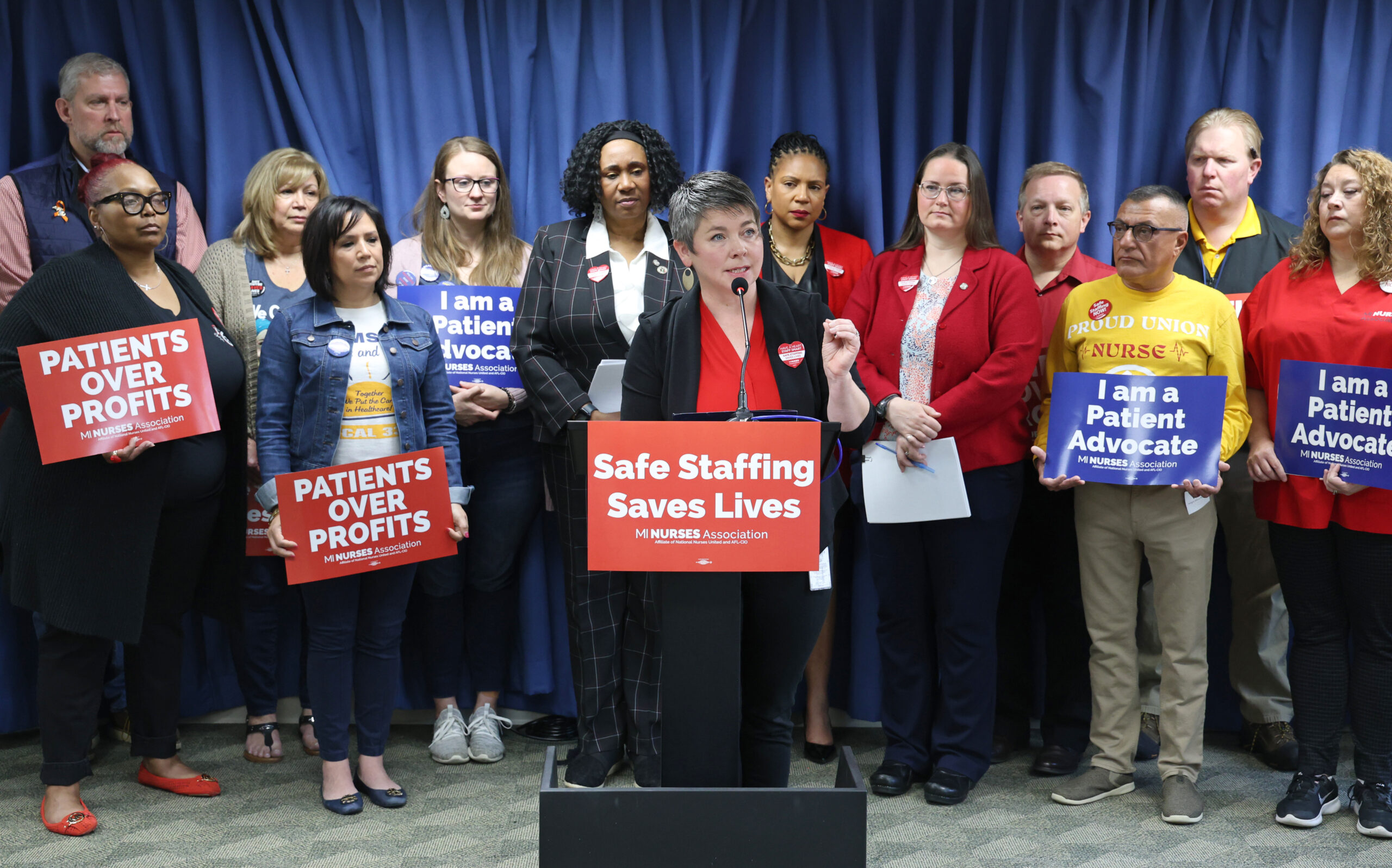LANSING, Mich., May 12, 2023 — State Rep. Betsy Coffia (D-Traverse City) joined a bicameral coalition of legislators this week to propose a legislative plan that would, among other things, set safe limits on the number of patients nurses can be assigned and require hospitals to disclose their RN staffing. Rep. Coffia’s bill in the package, House Bill 4551, would also curb excessive mandatory nurse overtime. The bills, known as the Safe Patient Care Act, aim to keep patients safe in Michigan hospitals and build and retain a strong nursing workforce.
“We cannot keep asking nurses to do more with less. Nurses have repeatedly shared the exhaustion and moral fatigue they are experiencing,” said Rep. Coffia. “Research has shown that requiring nurses to work too many hours is both unsafe for patients and increases the likelihood of RNs leaving the profession entirely. It’s time to end this outdated and dangerous practice.”
Coffia, nurses, and other elected officials held a press conference on Thursday to call for the passage of this legislation, which has dozens of co-sponsors from Republicans and Democrats alike, as part of the solution to the nurse retention and patient safety crises in Michigan’s hospitals.
“Healthcare is in crisis because of years of hospital understaffing. Every year, the situation gets worse. We have reached the point now where almost 40% of current nurses say that they are planning to leave within the next year,” said Jamie Brown, a critical care nurse and president of the Michigan Nurses Association (MNA). “Hospital executives have failed to fix the problem for over a decade. The only way to keep patients safe is through meaningful action that will hold corporate executives accountable. We need patients to be put before profits.”
A recently released survey of over 9,000 Michigan nurses reveals the scope of the issues facing nurses and patients. The University of Michigan study published in a peer-reviewed journal indicates that:
- When mandatory overtime is frequently used, nurses are 72% more likely to have left the profession within the past two years.
- Nearly 40% of Michigan nurses say they plan to leave their job within the next year.
- 83% of currently practicing nurses say adequate staffing is their main concern.
- 84% of currently practicing nurses report emotional exhaustion.
“With new leadership in government, we hope that this will be the year that meaningful action is taken,” said Jessica Lannon, RN, an MNA board member. “Every year for Nurses Week, RNs are told how important we are. While we appreciate the words, they are not enough. RNs are leaving the bedside because of worsening working conditions every day. The best way to honor nurses this May is to pass laws like the Safe Patient Care Act that make our working conditions better and will bring my fellow RNs back to direct care. Every day that we don’t act, hospitals become more dangerous for patients and nurses.”
An independent poll of Michigan nurses commissioned by MNA earlier this year found similar findings to University of Michigan’s survey of nurses. This poll, conducted by Emma White Research with a +/- 4.9% margin of error, found that:
- Over nine in ten RNs say requiring nurses to care for too many patients at once is affecting the quality of patient care.
- The number of nurses who say they know of a patient’s death due to nurses being assigned too many patients nearly doubled from 22% in 2016 to 42% this year.
- Requiring set nurse-to-patient ratios would make a difference in retaining and returning qualified nurses to the field. Three-quarters of nurses currently working in direct patient care say they would be more likely to stay if such legislation passes, while nearly four in ten who have left say they would be more likely to come back.
The poll also showed that the vast majority of RNs blame working conditions, not a shortage of qualified RNs, for the staffing crisis. Michigan Licensing and Regulatory Affairs (LARA) reported that there are 154,758 RNs with active Michigan licenses as of January. Yet only 102,480 people are employed as RNs in the state of Michigan, according to the U.S. Bureau of Labor Statistics. This means that a full one-third of RNs with active Michigan licenses are choosing to not work as nurses.
The bills in the package are sponsored in the state House and Senate by:
Limit the number of patients a nurse can be assigned
- Rep. Stephanie Young (D-Detroit), House Bill 4550
- Sen. Sylvia Santana (D-Detroit), Senate Bill 334
Curb forced RN overtime
- Rep. Betsy Coffia (D-Traverse City), House Bill 4551
- Sen. Stephanie Chang (D-Detroit), Senate Bill 335
Require hospitals to release their actual RN-to-patient ratios
- Rep. Carrie Rheingans (D-Ann Arbor), House Bill 4552
- Sen. Jeremy Moss (D-Southfield), Senate Bill 336

